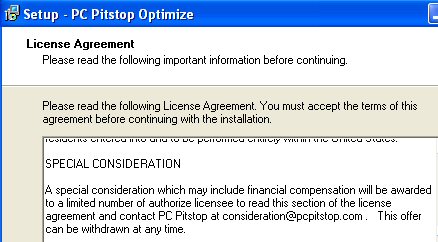Read The Flipping Licence

(Via Techdirt). It has become an internet cliché to point out that nobody reads click-wrap agreements. There is the now famous story of the anti-spyware software that included the promise to pay some money to the first person who emailed them. It took four months for somebody to email them, and they earned $1,000 USD for their troubles.
Nowadays, we are incessantlyy bombarded with click agreements, End-user Licence Agreements (EULA), licences and all sorts of legal documents. People tend to believe that just by clicking on the "I Agree" button, you must have entered into a contract and sold their soul, right? Pacta sunt servanda and all that.
Should people be worried by all of the clicking? Look at this article with a horror gallery of EULAs for spyware products. Claria (formerly Gator), has this beauty:
You agree that you will not use, or encourage others to use, any method to uninstall the Licensed Materials other than through the use of the Add/Remove Programs feature of the Microsoft operating system. Use of any robot, spider, other automatic or non-automatic manual device or process intended to interfere or attempt to interfere with the proper working of the Licensed Materials is prohibited.In other words, don't make it easy for people to remove the spyware. Then there is this one from iTunes:
Apple reserves the right, at any time and from time to time, to update, revise, supplement, and otherwise modify this Agreement and to impose new or additional rules, policies, terms, or conditions on your use of the Service. Such updates, revisions, supplements, modifications, and additional rules, policies, terms, and conditions (collectively referred to in this Agreement as "Additional Terms") will be effective immediately and incorporated into this Agreement. Your continued use of the iTunes Music Store following will be deemed to constitute your acceptance of any and all such Additional Terms. All Additional Terms are hereby incorporated into this Agreement by this reference.The question then is, are these terms legal? Fortunately, in Europe there is a well-developed culture of consumer protection that includes Unfair Terms legislation. One can assume that many of the more doubtful agreements will contain some unfair clauses. However, it is also clear that companies rely on the fact that the average consumer will not know of the existence of this legislation, and that they will comply just because they clicked "I agreee".
RTFL.

 del.icio.us
del.icio.us




No comments:
Post a Comment